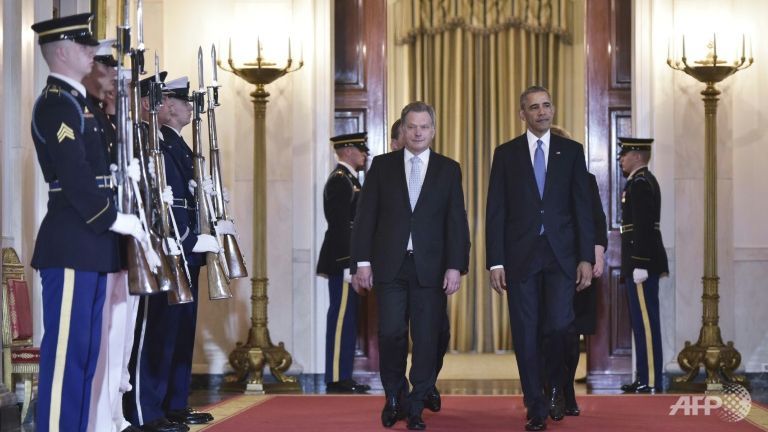Obama denounces Russia's 'aggressive' military stance in Europe
 |
| Finland's President Sauli Niinisto (L) and US President Barack Obama arrive for a welcome ceremony for the US-Nordic Leaders Summit, at the White House on May 13, 2016. (Photo: AFP/Mandel Ngan) |
WASHINGTON: US President Barack Obama warned Russia about its military build-up in northern Europe on Friday (May 13) as he hosted leaders from five Nordic countries at the White House.
"We are united in our concern about Russia's growing, aggressive military presence and posture in the Baltic-Nordic region," Obama said at the end of the meeting.
As tensions with Moscow spike over a plethora of issues from aerial military interceptions to Ukraine, Obama looked to make common cause with Russia's near neighbours in Denmark, Iceland, Finland, Sweden and Norway.
Earlier, Obama said the six nations agreed on the need for a European order not based on might. "We believe that our citizens have the right to live in freedom and security, free from terrorism, and a Europe where smaller nations are not bullied by larger nations."
Obama put Vladmir Putin's government on notice that, while willing to deescalate tensions, the White House would also be prepared to counter any perceived Russian aggression.
"We will be maintaining ongoing dialogue and seek cooperation with Russia but we also want to make sure that we are prepared and strong and we want to encourage Russia to keep its military activities in full compliance with international obligations," he said.
In a joint statement, the six countries expressed concern about Russia's actions in the Baltic Sea region - "its nuclear posturing, its undeclared exercises, and the provocative actions taken by Russian aircraft and naval vessels."
But as Obama hosted the meeting, Putin warned he will consider measures to "end threats" from US anti-missile systems that were recently activated in Romania.
'ILLEGAL OCCUPATION'
Tensions with Russia are currently at levels not seen since the Cold War.
Moscow's invasion of Ukraine and annexation of Crimea prompted biting sanctions against the Russian economy. Russian-backed militants have also taken control of swaths of the eastern part of the country.
In the joint statement, the group said they would only lift all sanctions on Russia once Crimea is returned to Ukrainian control.
"Russia's illegal occupation and attempted annexation of Crimea, which we do not accept, its aggression in Donbas, and its attempts to destabilize Ukraine are inconsistent with international law and violate the established European security order," the statement read.
Russia and the West have also clashed over Moscow's military intervention in Syria and its support for the regime of Bashar al-Assad.
And Russian aircraft now routinely harass NATO and Nordic military assets near the border and beyond.
Russia has darkly warned against Sweden and Finland joining NATO, an issue that is being debated in both countries.
But the joint statement showed Russia's strong-arm tactics may backfire by propelling them closer to the alliance.
"NATO remains key to transatlantic and European security, and the contributions of Sweden and Finland, including those they make as NATO enhanced opportunity partners, are highly valuable," it said.
Putin did not specify which actions he will take in response to the activation of the missile defence programme but according to Steven Pifer of the Brookings Institution, a Washington think tank, likely moves to upgrade weapons in Kaliningrad would have come anyway.
"The Russians will make their displeasure known. The West should anticipate irate declarations of military countermeasures," he said. "Categorising its military programs as countermeasures to Western military deployments has a long tradition with the Kremlin."
NATO leaders - including Obama - will meet in Warsaw next month.
What the stars mean:
★ Poor ★ ★ Promising ★★★ Good ★★★★ Very good ★★★★★ Exceptional
Latest News
More News
- 72 nations sign landmark Hanoi cybercrime convention (October 26, 2025 | 18:00)
- UN Secretary-General commends Vietnam’s global leadership (October 26, 2025 | 09:00)
- APEC finance ministers convene to tackle regional challenges (October 22, 2025 | 17:31)
- Rewiring global trade: ASEAN’s rise as supply chain hub (October 17, 2025 | 11:40)
- Vietnam attends first World Nuclear Week Forum in Russia (September 26, 2025 | 10:50)
- Vietnam attends 69th session of IAEA General Conference (September 16, 2025 | 10:00)
- ADB, WB pledge over 12 billion USD for ASEAN power grid, renewable energy projects (August 15, 2025 | 14:18)
- Lowy Institute proposes AI-based tobacco control solutions for ASEAN (August 15, 2025 | 14:14)
- Cloud computing policy to position Malaysia as regional hub by 2030 (August 15, 2025 | 14:11)
- Thailand, Cambodia suffer numerous cyber attacks (August 05, 2025 | 16:19)
















 Mobile Version
Mobile Version